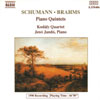Brahms: Chamber Works
View record and artist detailsRecord and Artist Details
Composer or Director: Johannes Brahms, Robert Schumann
Genre:
Chamber
Label: Naxos
Magazine Review Date: 2/1991
Media Format: CD or Download
Media Runtime: 67
Mastering:
Stereo
DDD
Catalogue Number: 8 550406

Tracks:
| Composition | Artist Credit |
|---|---|
| Quintet for Piano and Strings |
Robert Schumann, Composer
Jenö Jandó, Piano Kodály Quartet Robert Schumann, Composer |
Composer or Director: Johannes Brahms
Label: Decca
Magazine Review Date: 2/1991
Media Format: CD or Download
Media Runtime: 66
Mastering:
DDD
Catalogue Number: 425 839-2DH

Tracks:
| Composition | Artist Credit |
|---|---|
| Trio for Clarinet/Viola, Cello and Piano |
Johannes Brahms, Composer
Franklin Cohen, Clarinet Johannes Brahms, Composer Stephen Geber, Cello Vladimir Ashkenazy, Piano |
| Quintet for Piano and Strings |
Johannes Brahms, Composer
Cleveland Orch Quartet Johannes Brahms, Composer Vladimir Ashkenazy, Piano |
Composer or Director: Johannes Brahms
Label: Decca
Magazine Review Date: 2/1991
Media Format: Cassette
Media Runtime: 0
Mastering:
DDD
Catalogue Number: 425 839-4DH

Tracks:
| Composition | Artist Credit |
|---|---|
| Trio for Clarinet/Viola, Cello and Piano |
Johannes Brahms, Composer
Franklin Cohen, Clarinet Johannes Brahms, Composer Stephen Geber, Cello Vladimir Ashkenazy, Piano |
| Quintet for Piano and Strings |
Johannes Brahms, Composer
Cleveland Orch Quartet Johannes Brahms, Composer Vladimir Ashkenazy, Piano |
Author: Christopher Headington
The Naxos recording of these two big works is not quite as good as the performances, the tone of the strings being a little plummy in the Schumann and that of the piano heavyish, while the dynamic range could be greater and the Budapest location strikes me as rather too reverberant. But it is perfectly serviceable and will not stand in the way of the music unless you have an ultra-critical ear, so that although the alternative Frankl/Lindsay version is better from this point of view and expertly played, a strong recommendation should not be denied to this new CD at its super-bargain price.
The Decca performance of the Brahms Quintet by Ashkenazy and his American colleagues glows with rich colour throughout, partly because of the mellow interpretation but also because of the sweetness of the string tone; the recording in the Cleveland Masonic Auditorium seems to me well judged, too, and though a bit more distance might have given it still more atmosphere I found it most pleasing. The tonal subtlety of the playing may be judged at once in the hushed opening of the first movement, which is beautifully done, and another wholly different but equally effective kind of soft playing, full of tension, is to be heard at the start of the scherzo. Furthermore, the kind of masterly yet warm-hearted authority which Ashkenazy brings to the chordal opening of the trio section of this same movement (at 3' 03'') lends the performance a special distinction. He and the Cleveland are also splendidly eloquent in the strange and somewhat elusive Poco sostenuto introduction to the finale, and what follows doesn't disappoint either; indeed, the high expectations which these artists have probably generated in a listener at the beginning of the whole Quintet are unlikely to be disappointed. It's worth adding, of course, that the warmth of the playing doesn't imply any lack of strength—in fact there are ample thrills and fine outpourings of power and it seems to me that the dramatic unfolding of this big work is admirably judged.
I have not yet mentioned the Clarinet Trio which opens the programme on this Decca issue, in which the clarinettist is the thoughtful Franklin Cohen. It's a late work which Brahms composed for the clarinettist Richard Muhlfeld in the same year as his better known and wonderfully autumnal Clarinet Quintet. This is minor-mode music in which melancholy seems never far away, but at the same time, as one of the composer's friends remarked, it is also ''as if the instruments were in love with each other''. Incidentally, although there are four movements there is no scherzo, and the Adagio second movement is followed by an Andante grazioso. This is another stylish performance, and the issue is thus a most desirable one, well worth its full price.'
Discover the world's largest classical music catalogue with Presto Music.

Gramophone Digital Club
- Digital Edition
- Digital Archive
- Reviews Database
- Full website access
From £8.75 / month
Subscribe
Gramophone Full Club
- Print Edition
- Digital Edition
- Digital Archive
- Reviews Database
- Full website access
From £11.00 / month
Subscribe
If you are a library, university or other organisation that would be interested in an institutional subscription to Gramophone please click here for further information.





